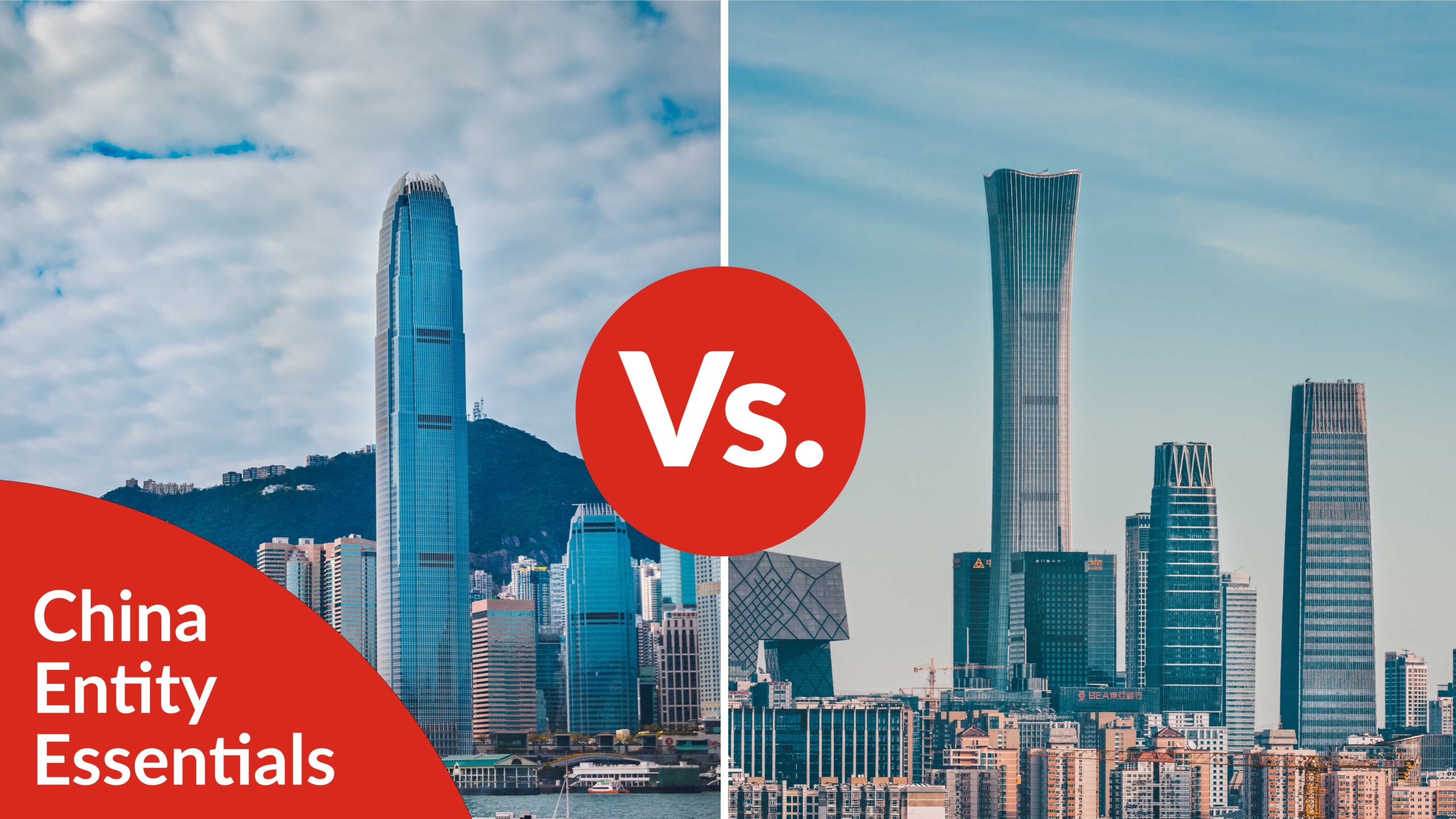Welcome to the Latest Installment of Our Entity Essentials!
An on-the-ground operation to manage your China supply chain is crucial. However, it is sometimes unclear whether to establish a regional office in Hong Kong or venture directly into an entity set up in mainland China.
In this guide, we’ll dissect the complexities and nuances of setting up an entity in Hong Kong and the mainland.
Whether you’re a newcomer to the region or looking to enhance an existing foothold from a regional hub in Hong Kong, this comparison aims to illuminate the path that best aligns with your goals.
Entity Set up in mainland China vs. Hong Kong – What’s the Difference?
The first big surprise is that the transition from the UK to Hong Kong is much easier than from Hong Kong to China. Here’s why:
With a legal system rooted in English common law, English as an official language, and a low and simple tax system, Hong Kong offers a straightforward setup process, relaxed capital controls, and fewer reporting requirements.
However, if your business plan calls for direct sales in China or investment into the market, your Hong Kong entity will not be able to support operations in the mainland. The obvious option is to set up an entity on the mainland, but be prepared; China’s strict capital controls and monthly audit reports add layers of complexity.
Put simply: Hong Kong offers a business experience akin to most major economies. At the same time, the mainland, though more challenging, is your gateway to building an established footprint in the Middle Kingdom.
In What Scenario Might You Need to Set Up a Mainland Entity?
- Direct Employment in China: If you want to sign employment contracts with your employees, a mainland entity is necessary.
- Selling Products/Services in China: A mainland setup is essential for products/services requiring certain licenses.
- Selling to Chinese Companies: Setting up in mainland China may facilitate payment collection.
- You operate a Trading Company in Hong Kong: A Hong Kong company can be useful for trading but beware of the permanent establishment risk. If your activities on the mainland are substantial enough to be considered a permanent presence, you may be subject to China’s corporate income tax and compliance requirements. This could lead to unexpected tax liabilities and double taxation if also taxed in Hong Kong.
Timeline and Required Documents
Hong Kong: In Hong Kong, setting up a company is a relatively quick and straightforward process, typically taking about four to six weeks. The required documents are standard and include the Article of Association, Acceptance of Appointment, First Board Meeting, Form NNC1, and Share Certificate. Additionally, the appointment of a company secretary is mandatory, and this role can be filled by either an individual resident or a corporate entity with a registered office in Hong Kong.
Mainland: In contrast, setting up a company on the mainland is more intricate and time-consuming, potentially taking over half a year. You’ll also need to assign a legal representative, a role with significant powers and personal liability.
Presence on the ground while setting up is essential. The requirements vary significantly depending on the locale, business type and industry. Generally, the following documents are needed:
- Business License Application Form: Completed and signed by authorized representatives.
- Feasibility Study Report: Outlining the business plan and operational details.
- Articles of Association: Detailing the company’s rules and regulations.
- Passport Copies: For all foreign directors and shareholders.
- Bank Reference Letters: Confirming the financial credibility of the investors.
- Lease Agreement: For the proposed office location in China.
- Other Relevant Permits and Certifications: Depending on the industry and region.
Given the complexity of the process, collaboration with a local agency experienced in Chinese business regulations is often necessary. This partnership can guide you through the maze of requirements, ensuring that all legal and regulatory obligations are met.
Opening a Bank Account
Hong Kong: Opening a corporate bank account in Hong Kong can be complex, especially if you don’t reside in the region. Strict due diligence processes often lead to unsuccessful applications. However, the rise of digital banking solutions like Currenxie and Air Wallex has provided viable alternatives, easing this challenge.
Mainland: On the mainland, physical presence is necessary when opening a bank account. Except for international banks like HSBC, English-language services are rare. The company’s legal representative must be physically present to open the account, adding another layer to the process.
If you plan to employ personnel, you will need to open an account with a local Chinese bank. HSBC and other foreign banks do not have the ability to contract with a local social security office!
Ongoing Commitments: Understanding the Differences
Ongoing administrative tasks are vital to maintaining your business, but the requirements vary significantly between Hong Kong and mainland China.
Mainland: Entities in mainland China are required to submit reports to relevant tax bureaus every month. Additionally, the legal representative must frequently sign documents for the entity set up in mainland China. Therefore, choosing someone either in China or comfortable with frequent travel is advisable.
Hong Kong: In contrast, Hong Kong requires only annual reporting, making the ongoing commitment less demanding.
The Final Call: Weighing the Pros and Cons
Hong Kong: With a business environment akin to most major economies, Hong Kong offers a more familiar and accessible entry point. Its streamlined processes and annual reporting make it an attractive option for many international businesses.
Mainland: Though more challenging, the entity set up in mainland China provides direct access to the vast Chinese market. It enables closer engagement with local customers, suppliers, and regulatory environments but comes with more complex requirements and ongoing commitments.
The China Desk by Kinyu: For those seeking the advantages of a mainland entity without the associated complexities, The China Desk by Kinyu offers a tailored solution. Talk to us or download a case study to find out more!



